 Tìm kiếm
Tìm kiếm
Phần thứ ba Bộ luật Tố tụng hình sự 2015: Truy tố
| Số hiệu: | 101/2015/QH13 | Loại văn bản: | Luật |
| Nơi ban hành: | Thủ tướng Chính phủ | Người ký: | Nguyễn Sinh Hùng |
| Ngày ban hành: | 27/11/2015 | Ngày hiệu lực: | 01/01/2018 |
| Ngày công báo: | 31/12/2015 | Số công báo: | Từ số 1271 đến số 1272 |
| Lĩnh vực: | Trách nhiệm hình sự, Thủ tục Tố tụng | Tình trạng: | Còn hiệu lực |
TÓM TẮT VĂN BẢN
Bộ luật tố tụng hình sự 2015 vừa được ban hành ngày 27/11/2015 với nhiều quy định mới về cơ quan tiến hành tố tụng và người tiến hành tố tụng hình sự; người tham gia tố tụng HS; bào chữa, bảo về quyền và nghĩa vụ của bị hại, đương sự; biện pháp ngăn chặn, biện pháp cưỡng chế;...
Bộ luật tố tụng hình sự năm 2015 gồm 9 Phần, 36 Chương, 510 Điều (thay vì Bộ luật Tố tụng Hình sự 2003 gồm 8 Phần, 37 Chương, 346 Điều). Bộ luật TTHS 2015 gồm các Phần sau:
- Những quy định chung
- Khởi tố, điều tra vụ án hình sự
- Truy tố
- Xét xử vụ án hình sự
- Một số quy định về thi hành bản án, quyết định của Tòa án
- Xét lại bản án, quyết định đã có hiệu lực pháp luật
- Thủ tục đặc biệt
- Hợp tác quốc tế
- Điều khoản thi hành
Bộ luật tố tụng HS 2015 có một số quy định nổi bật sau:
- Điều 73 về quyền và nghĩa vụ của người bào chữa
Người bào chữa có quyền quy định tại Khoản 1 Điều 73 Bộ luật 101/2015/QH13, trong đó có quyền:
+ Gặp, hỏi người bị buộc tội;
+ Có mặt trong hoạt động đối chất, nhận dạng, nhận biết giọng nói và hoạt động điều tra khác theo Bộ luật tố tụng hình sự 2015;
+ Xem biên bản về hoạt động tố tụng có sự tham gia của mình, quyết định tố tụng liên quan đến người mà mình bào chữa;
+ Đề nghị tiến hành hoạt động tố tụng theo Bộ luật tố tụng hình sự năm 2015; đề nghị triệu tập người làm chứng, người tham gia tố tụng khác, người có thẩm quyền tiến hành tố tụng;
+ Kiểm tra, đánh giá và trình bày ý kiến về chứng cứ, tài liệu, đồ vật liên quan và yêu cầu người có thẩm quyền tiến hành tố tụng kiểm tra, đánh giá;
- Điều 78 Bộ luật số 101 tố tụng hình sự 2015 quy định thủ tục đăng ký bào chữa
+ Trong mọi trường hợp tham gia tố tụng, người bào chữa phải đăng ký bào chữa.
+ Khi đăng ký bào chữa, người bào chữa phải xuất trình các giấy tờ:
Luật sư xuất trình Thẻ luật sư kèm theo bản sao có chứng thực và giấy yêu cầu luật sư;
Người đại diện của người bị buộc tội xuất trình CMND hoặc thẻ Căn cước công dân kèm theo bản sao có chứng thực và giấy tờ có xác nhận về mối quan hệ của họ với người bị buộc tội;
Bào chữa viên nhân dân xuất trình CMND hoặc thẻ Căn cước công dân kèm theo bản sao có chứng thực và văn bản cử bào chữa viên nhân dân;
Trợ giúp viên pháp lý, luật sư thực hiện trợ giúp pháp lý xuất trình văn bản cử người thực hiện trợ giúp pháp lý và Thẻ trợ giúp viên pháp lý hoặc Thẻ luật sư kèm theo bản sao có chứng thực.
- Điều 85 Luật 101/2015/QH13 bổ sung một số vấn đề phải chứng minh trong vụ án hình sự gồm:
+ Nguyên nhân và điều kiện phạm tội;
+ Những tình tiết khác liên quan đến việc loại trừ trách nhiệm hình sự, miễn trách nhiệm hình sự, miễn hình phạt.
- Quy định dữ liệu điện tử tại Điều 99 Bộ luật tố tụng hình sự năm 2015
+ Dữ liệu điện tử được thu thập từ phương tiện điện tử, mạng máy tính, mạng viễn thông, trên đường truyền và các nguồn điện tử khác.
+ Giá trị chứng cứ của dữ liệu điện tử được xác định căn cứ vào cách thức khởi tạo, lưu trữ hoặc truyền gửi dữ liệu điện tử; cách thức bảo đảm và duy trì tính toàn vẹn của dữ liệu điện tử; cách thức xác định người khởi tạo và các yếu tố phù hợp khác.
- Điều 143 Bộ luật tố tụng hình sự bổ sung căn cứ khởi tố vụ án hình sự:
+ Kiến nghị khởi tố của cơ quan nhà nước;
Kiến nghị khởi tố là việc cơ quan nhà nước có thẩm quyền kiến nghị bằng văn bản và gửi kèm theo chứng cứ, tài liệu liên quan cho Cơ quan điều tra, Viện kiểm sát có thẩm quyền xem xét, xử lý vụ việc có dấu hiệu tội phạm.
- Khám nghiệm tử thi theo Điều 202 Luật số 101/2015/QH13
Khi khám nghiệm tử thi phải tiến hành chụp ảnh, mô tả dấu vết để lại trên tử thi; chụp ảnh, thu thập, bảo quản mẫu vật phục vụ công tác trưng cầu giám định; ghi rõ kết quả khám nghiệm vào biên bản. Biên bản khám nghiệm tử thi được lập theo Điều 178 Bộ luật TTHS 2015.
- Điều 215 Bộ luật tố tụng HS 2015 quy định yêu cầu định giá tài sản
+ Khi cần xác định giá của tài sản để giải quyết vụ án hình sự, cơ quan có thẩm quyền tiến hành tố tụng ra văn bản yêu cầu định giá tài sản.
+ Trong thời hạn 24 giờ kể từ khi ra văn bản yêu cầu định giá tài sản, cơ quan yêu cầu định giá phải giao hoặc gửi văn bản yêu cầu định giá tài sản, hồ sơ, đối tượng yêu cầu định giá tài sản cho Hội đồng định giá tài sản được yêu cầu; gửi văn bản yêu cầu định giá tài sản cho Viện kiểm sát có thẩm quyền thực hành quyền công tố và kiểm sát điều tra.
- Trường hợp áp dụng biện pháp điều tra tố tụng đặc biệt tại Điều 224 Bộ luật 101/2015/QH13
Có thể áp dụng biện pháp điều tra tố tụng đặc biệt đối với các trường hợp:
+ Tội xâm phạm an ninh quốc gia, tội phạm về ma túy, tội phạm về tham nhũng, tội khủng bố, tội rửa tiền;
+ Tội phạm khác có tổ chức thuộc loại tội phạm đặc biệt nghiêm trọng.
- Điều 322 Bộ luật tố tụng hình sự 2015 quy định việc tranh luận tại phiên tòa
+ Bị cáo, người bào chữa, người tham gia tố tụng khác có quyền trình bày ý kiến, đưa ra chứng cứ, tài liệu và lập luận của mình để đối đáp với Kiểm sát viên về những chứng cứ xác định có tội, chứng cứ xác định vô tội; tính chất, mức độ nguy hiểm cho xã hội của hành vi phạm tội; hậu quả do hành vi phạm tội gây ra; nhân thân và vai trò của bị cáo trong vụ án; những tình tiết tăng nặng, giảm nhẹ trách nhiệm hình sự, mức hình phạt; trách nhiệm dân sự, xử lý vật chứng, biện pháp tư pháp; nguyên nhân, điều kiện phạm tội và những tình tiết khác có ý nghĩa đối với vụ án.
Bị cáo, người bào chữa, người tham gia tố tụng khác có quyền đưa ra đề nghị của mình.
+ Kiểm sát viên phải đưa ra chứng cứ, tài liệu và lập luận để đối đáp đến cùng từng ý kiến của bị cáo, người bào chữa, người tham gia tố tụng khác tại phiên tòa.
Người tham gia tranh luận có quyền đáp lại ý kiến của người khác.
Bộ luật tố tụng hình sự năm 2015 có hiệu lực từ ngày 01/07/2016.
Văn bản tiếng việt
Văn bản tiếng anh
PROSECUTION
GENERAL
Article 236. Duties and authorities of The procuracy exercising prosecution rights during the stage of prosecution
1. Decide to implement, alter or terminate preventive and coercive measures; request investigation authorities to issue wanted notices against suspects.
2. Request authorities and entities to provide documents related to the case when necessary
3. A Court returns documents to investigation authorities, which The procuracy deems unnecessary, for further investigation; therefore, the Procuracy is entitled to directly carry out certain activities of investigation. Moreover, its direct investigative activities can contribute to the verification and addition of documents and evidences for making decisions to prosecute.
4. Decide to press charges, amend or supplement decisions to file lawsuits or charges against suspects upon the detection of criminal acts or other offenders not charged or investigated.
5. Decide to return documents to investigation authorities for further investigation.
6. Decide to join and separate cases; transfer lawsuits to competent authorities for prosecution, implement summary procedures and civil commitment.
7. Decide to or not to extend the time limit for prosecution, and duration of preventive and coercive measures.
8. Decide to prosecute.
9. Decide to dismiss or adjourn cases; to dismiss or adjourn lawsuits against suspects; to resume cases or lawsuits against suspects.
10. Carry out other duties and powers to make decisions on prosecution as per this Law.
Article 237. Duties and authorities of The procuracy administering activities during the stage of prosecution
1. The procuracy, when administering activities during the stage of prosecution, bears these duties and authority:
a) Administer criminal proceedings of participants in legal procedure; request competent authorities and entities to implement strict measures against participants in legal proceedings, who breach laws;
b) Request concerned authorities and organizations to implement preventive measures against crimes and breach of laws;
c) Perform other duties and authority to administer activities during the stage of prosecution according to this Law.
2. Competent authorities and entities, in 10 days upon receiving requests as stated in Point a and Point b, Section 1 of this Article, shall be responsible for informing The procuracy of the their fulfillment of such requests.
Article 238. Delivery of case files and written conclusions of investigation
1. When investigation authorities and units assigned to investigate hand over case files and written conclusions of investigation for prosecution and evidences (if any), the Procuracy shall inspect and handle information in the following manner:
a) If case files and accompanying exhibits (if any) suffice according to the list of documents and evidences and suspects or their representatives receive the written conclusion of investigation, the Procuracy shall obtain case files;
b) If case files and accompanying exhibits (if any) do not suffice according to the list of documents and evidences, or the written conclusion of investigation is not given to suspects or their representatives, the Procuracy shall refuse to take in case files and request investigation authorities and units assigned to investigate to supplement documents and exhibits or to provide suspects or their representatives with the written conclusion of investigation.
2. The delivery of case files and written conclusion of investigation shall be executed in writing as per Article 133 of this Law and inputted into case files.
Article 239. The authority to prosecute
1. The procuracy exercising prosecution rights and administering investigative activities shall make decisions on prosecution. A procuracy’s authority to prosecute shall be subject to the Court's jurisdiction over the case.
If a case goes beyond a Procuracy's authority to prosecute, the Procuracy shall promptly decide to transfer the case to another competent Procuracy. A provincial People’s Procuracy or Military procuracy of a military zone shall decide the transfer of cases to procuracies out of the province, centrally-affiliated city or military zone.
A superior Procuracy shall decide to prosecute cases, against which it exercises prosecution rights and administer investigation. The superior Procuracy, in 02 month prior to the closure of the investigation, must inform the lower Procuracy, at the level equivalent to that of the first-instance Court having jurisdiction over the case, to assign procurators to examine case files. The superior Procuracy, when issuing a decision to prosecute, shall assign the lower Procuracy to exercise prosecution rights and administer the process of adjudication. The competent inferior Procuracy, upon receiving case files and charging documents, shall exercise prosecution rights and administer the process of adjudication as per this Law.
2. A Procuracy, in 03 days upon issuing a decision on case transfer, must inform in writing the investigation authority closing the investigation, suspects or their representatives, defense counsels, aggrieved persons and other participants in legal proceedings.
The delivery of case files and charging documents shall occur as per Section 2, Article 240 of this Law. In such event, the time limit for prosecution shall commence after the prosecutor authorized to prosecute receives case files.
Article 240. Time limit for the issuance of decisions to prosecute
1. A Procuracy, in 20 days for misdemeanors and felonies or 30 days for horrific and extremely severe felonies upon receiving case files and written conclusion of investigation, must make one of the following decisions:
a) Prosecute suspects in a Court;
b) Return documents for further investigation;
c) Dismiss or adjourn the case; dismiss or adjourn lawsuits against suspects;
The head of The procuracy, when necessary, may extend the time limit for the issuance of a decision to prosecute for 10 more days for misdemeanors or felonies or 15 more days for horrific felonies or at most 30 more days for extremely severe felonies.
2. The procuracy, in 03 days upon making one of the decisions as stated in Section 1 of this Article, must inform suspects, their defense counsels or representatives and crime victims of the return of documents for further investigation. Moreover, it shall in 03 days provide suspects or their representatives, investigation authorities and defense counsels with charging documents, decisions to adjourn or dismiss the case or lawsuit against suspects. Furthermore, it shall send notices to crime victims, litigants and protectors of their legitimate rights and benefits.
The delivery of the said documents shall be executed in writing according to Article 133 of this Law and be inputted in case files.
If the case is complex, the time limit for the delivery of charging documents and decisions on suspension or dismissal of the case to suspects or their representatives may be extended for 10 more days at most.
3. The decisions as stated in Section 1 of this Article, when made, must be promptly sent to the superior Procuracy. The head of the superior Procuracy shall be entitled to revoke, terminate or annul decisions deemed groundless or unlawful and to request the lower Procuracy to make lawful decisions.
Article 241. Implementation, alteration and termination of preventive and coercive measures
The procuracy, when receiving case files and written conclusion of investigation, shall be entitled to decide to implement, alter or terminate preventive and coercive measures according to this Law.
The time limit for preventive measures during the stage of prosecution shall not exceed that defined in Section 1, Article 240 of this Law.
Article 242. Joinder or separation in cases during the stage of prosecution
1. The procuracy shall decide to join issues into one case in the following events:
a) The suspect commits multiple crimes;
b) The suspect commits a crime in multiple times;
c) Several suspects commit one crime, or there are accomplices and accessories who conceal or fail to report the suspect or use property obtained by crime.
2. When the lawsuit against the suspect is suspended, the Procuracy shall decide to separate issues from a case in the following events, if separation is deemed not to affect the determination of unbiased and comprehensive truths:
a) Suspects abscond;
b) Suspects suffer from fatal diseases;
c) Civil commitment is imposed on suspects.
DECISION TO PROSECUTE SUSPECTS
Article 243. Decision to prosecute suspects
The procuracy shall decide to prosecute a suspect in a Court through charging documents.
Charging documents shall detail the progress and acts of crime; evidences clarifying suspects’ crimes, their artifices, motives, purposes, nature and degree of damage caused by the crimes; preventive and coercive measures enforced, altered or terminated; factors aggravating and mitigating criminal liabilities, traits and personal record of suspects; seizure and impoundment of documents and items, handling of evidences; reasons and circumstances leading to the crimes and other facts significant to the case.
The conclusion of the charging documents shall specify offence titles and articles, sections and points quoted from the Criminal Code.
Charging documents shall specify their date of issuance, full name and position of the person releasing such documents and bear his signature.
Article 244. Transfer of case files and charging documents to the Court
The procuracy, in 03 days upon issuing charging documents, must submit case files and charging documents to the Court. The time limit for filing papers and charging documents of a complex case in the Court may be extended for 10 more days at most.
If suspects are in detention, the Procuracy shall, in 07 days prior to the end of the detention, inform the Court to consider and decide the detention of such suspects before obtaining case files.
Article 245. Return of case files for further investigation
1. The procuracy shall decide to return case files and request investigation authorities to conduct further investigative activities in one of the following events:
a) Evidences do not suffice to evince one of the matters as stated in Article 85 of this Law; however, the Procuracy fails to supplement evidences by itself;
b) There are justifications to press charges against the suspect for one or many crimes;
c) Accomplices or other offenders related to the case have not been charged;
d) Serious violations of legal procedure occur.
2. A decision to return documents and request further investigation must detail additional issues to be investigated according to Point 1 of this Article and Point 2, Article 132 of this Law.
3. Investigation authorities shall be responsible for fulfilling requests that are stated in the Procuracy’s decision to return documents for further investigation. If they fail to accomplish the requests due to force majeure or objective obstacles, reasons of such failure must be clearly reported in writing.
Investigation authorities, when closing additional investigation, shall conclude such investigation in writing. The written conclusion of the additional investigation shall specify additional findings and standpoints for the settlement of the case. If the additional findings basically conflict with previous ones, investigation authorities shall issue a new conclusion of investigation to replace the old one.
The transfer of case files and additional conclusion of investigation to The procuracy and the delivery of notices of additional findings shall be governed by Article 232 and Article 238 of this Law
Article 246. Handling of the Court’s request for further investigation
If the Court decides to return case files and request further investigation, the Procuracy shall consider justifications for further investigation and handle such request in the following manner:
1. The Court reach a justified decision to return documents to investigation authorities, which The procuracy deems unnecessary, for further investigation; therefore, the Procuracy is entitled to directly carry out certain activities of investigation to supplement documents and evidences. However, the Procuracy, if unable to conduct further investigation, shall forward documents to investigation authorities for additional investigative activities.
If additional findings alter the fundamentals of existing charging documents, the Procuracy shall redress such documents and convey documents to the Court. If additional findings lead to the dismissal of the case, the Procuracy shall decide to have the case dismissed and send a notice to the Court;
2. The procuracy, if finding no justifications for the return of documents for further investigation, shall state its reasons, maintain the decision to prosecute and send documents back to the Court.
Article 247. Suspension of cases
1. The procuracy shall decide to suspend a case in the following events:
b) If judicial expert examination finds that the suspect suffer from mental illness or fatal diseases, the case may be suspended prior to the expiration of the time limit for the issuance of a decision to prosecute;
b) Though the time limit for issuing a decision to prosecute expires, the suspect absconds to an unknown location. In this event, investigation authorities shall be requested to release a wanted notice against the suspect prior to the suspension of the case. The search for the suspect shall abide by Article 231 of this Law;
c) Time limit for issuing a decision to prosecute expires while expert examination, valuation process or judicial assistance, though requested, does not progress. In such event, expert examination, valuation process and judicial assistance shall continue until results are achieved.
2. A decision to suspend a case must specify reasons and justifications for suspension, relevant details and other matters as stated in Section 2, Article 132 of this Law.
If there are several suspects in one case but the reason for case suspension does not apply to all of them, the lawsuit against each suspect shall be suspended separately.
Article 248. Dismissal of cases
1. The procuracy shall decide not to prosecute and to dismiss the case when possessing one of the justifications as defined in Section 2, Article 155 and Article 157 of this Law or as stated in Article 16 or Article 19 or Section 2, Article 91 of the Criminal Code.
2. A decision to dismiss a case must specify reasons and justifications for the dismissal of the case, termination of preventive and coercive measures, handling of evidences, documents and items impounded (if any), other relevant matters and other details as stated in Section 2, Article 132 of this Law. If there are many suspects in one case but the justifications for case dismissal do not apply to all of them, the case shall be dismissed separately for each suspect.
Article 249. Resumption of cases
1. The procuracy, when having justifications to annul the decision to suspend or dismiss a case, shall decide to resume the case if the prescriptive period for criminal prosecution remains effective. If the case is dismissed according to Section 5 and Section 6, Article 157 of this Law without the consent of the suspect who petitions for case resumption, the Procuracy shall decide to resume the case. The case can be resumed fully or partly against each suspect.
2. A decision to resume a case must specify reasons and justifications for case resumption, relevant matters and details as stated in Section 2, Article 132 of this Law.
3. The procuracy, in 03 days upon making the decision, shall send the decision to resume case or lawsuit against a suspect to the suspect, his defense counsel or representative, authorities closing the investigation; and send a notice to the crime victims, litigants and protectors of their legitimate rights and benefits.
The delivery of the decision to resume the case or lawsuit against the suspect shall be executed in writing and inputted into the case file.
4. The time limit for issuing a decision to prosecute upon the resumption of the case shall be subject to universal stipulations in this Law and commence upon the Procuracy’s issuance of the decision to resume the case.
5. The procuracy, when resuming a case, shall be entitled to enforce, alter or terminate preventive and coercive measures as per this Law.
If there are justifications for detention as per this Law, the duration of detention for the resumption of the case shall not exceed the time limit for the issuance of a decision to prosecute.
Văn bản liên quan
Cập nhật
Điều 155. Khởi tố vụ án hình sự theo yêu cầu của bị hại
Điều 157. Căn cứ không khởi tố vụ án hình sự
Điều 268. Thẩm quyền xét xử của Tòa án
Điều 285. Viện kiểm sát rút quyết định truy tố
Điều 367. Thủ tục xem xét bản án tử hình trước khi thi hành
Điều 401. Thời hạn kháng nghị theo thủ tục tái thẩm
Ðiều 419. Áp dụng biện pháp ngăn chặn, biện pháp cưỡng chế
Điều 447. Điều kiện và thẩm quyền áp dụng biện pháp bắt buộc chữa bệnh
Điều 57. Người bị tố giác, người bị kiến nghị khởi tố
Điều 58. Người bị giữ trong trường hợp khẩn cấp, người bị bắt
Điều 65. Người có quyền lợi, nghĩa vụ liên quan đến vụ án
Điều 73. Quyền và nghĩa vụ của người bào chữa
Điều 75. Lựa chọn người bào chữa
Điều 76. Chỉ định người bào chữa
Điều 78. Thủ tục đăng ký bào chữa
Điều 80. Gặp người bị bắt, người bị tạm giữ, bị can, bị cáo đang bị tạm giam
Điều 83. Người bảo vệ quyền và lợi ích hợp pháp của người bị tố giác, người bị kiến nghị khởi tố
Điều 84. Người bảo vệ quyền và lợi ích hợp pháp của bị hại, đương sự
Điều 148. Tạm đình chỉ việc giải quyết tố giác, tin báo về tội phạm, kiến nghị khởi tố
Điều 241. Áp dụng, thay đổi, hủy bỏ biện pháp ngăn chặn, biện pháp cưỡng chế
Điều 278. Áp dụng, thay đổi, hủy bỏ biện pháp ngăn chặn, biện pháp cưỡng chế
Điều 347. Áp dụng, thay đổi, hủy bỏ biện pháp ngăn chặn, biện pháp cưỡng chế
Điều 133. Chương trình an toàn, vệ sinh lao động
Mục 4. LAO ĐỘNG LÀ NGƯỜI KHUYẾT TẬT
Điều 41. Nhiệm vụ, quyền hạn và trách nhiệm của Viện trưởng, Phó Viện trưởng Viện kiểm sát
Điều 42. Nhiệm vụ, quyền hạn và trách nhiệm của Kiểm sát viên
Điều 110. Giữ người trong trường hợp khẩn cấp
Điều 125. Hủy bỏ hoặc thay thế biện pháp ngăn chặn
Điều 156. Thay đổi hoặc bổ sung quyết định khởi tố vụ án hình sự
Điều 169. Chuyển vụ án để điều tra
Điều 173. Thời hạn tạm giam để điều tra
Điều 180. Thay đổi hoặc bổ sung quyết định khởi tố bị can
Điều 228. Hủy bỏ việc áp dụng biện pháp điều tra tố tụng đặc biệt
Điều 236. Nhiệm vụ, quyền hạn của Viện kiểm sát khi thực hành quyền công tố trong giai đoạn truy tố
Điều 238. Giao, nhận hồ sơ vụ án và bản kết luận điều tra
Điều 246. Giải quyết yêu cầu điều tra bổ sung của Tòa án
Điều 368. Thủ tục xét tha tù trước thời hạn có điều kiện
Điều 433. Khởi tố bị can, thay đổi, bổ sung quyết định khởi tố bị can đối với pháp nhân
Điều 443. Tạm đình chỉ điều tra, đình chỉ điều tra, đình chỉ vụ án, đình chỉ bị can, bị cáo
Điều 457. Quyết định áp dụng thủ tục rút gọn
Bài viết liên quan
Lệnh cấm đi khỏi nơi cư trú giao cho ai năm 2025?
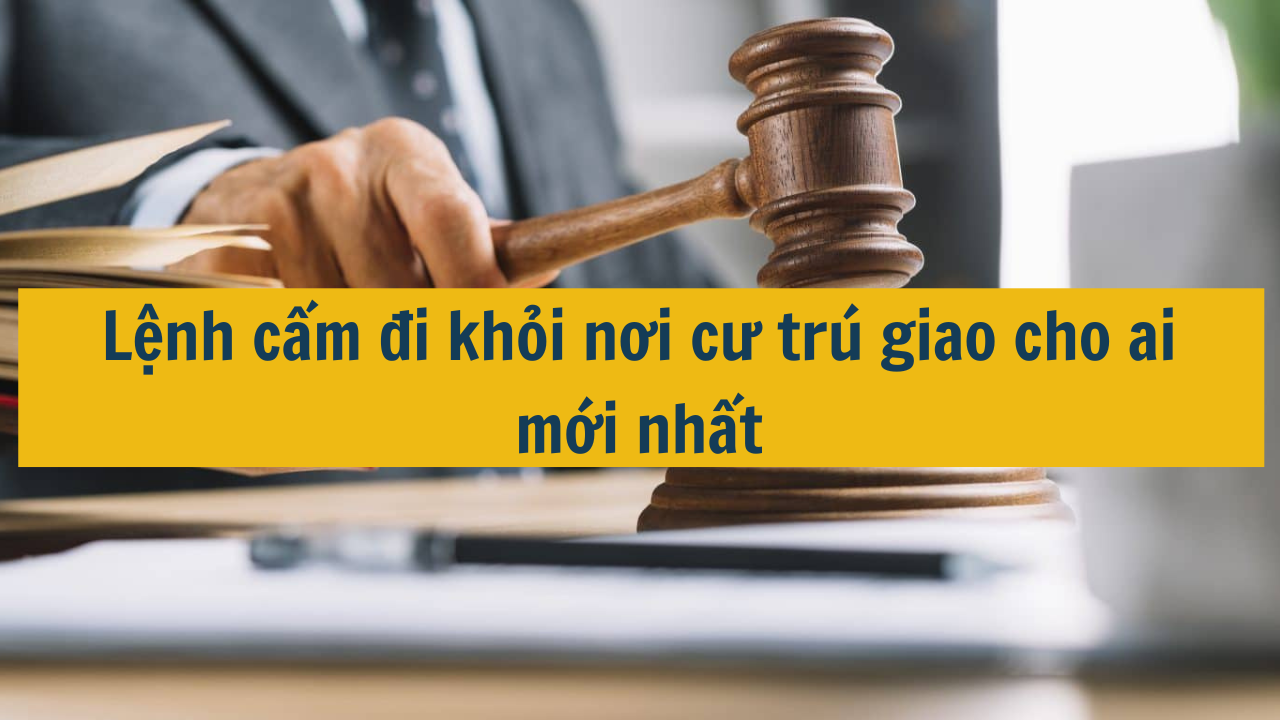
Lệnh cấm đi khỏi nơi cư trú giao cho ai năm 2025?
Lệnh cấm đi khỏi nơi cư trú thuộc thẩm quyền của ai. Bài viết sau đây sẽ làm rõ vấn đề này và các vẫn đề liên quan. 21/01/2025Thời hạn lệnh cấm đi khỏi nơi cư trú là bao lâu mới nhất năm 2025?
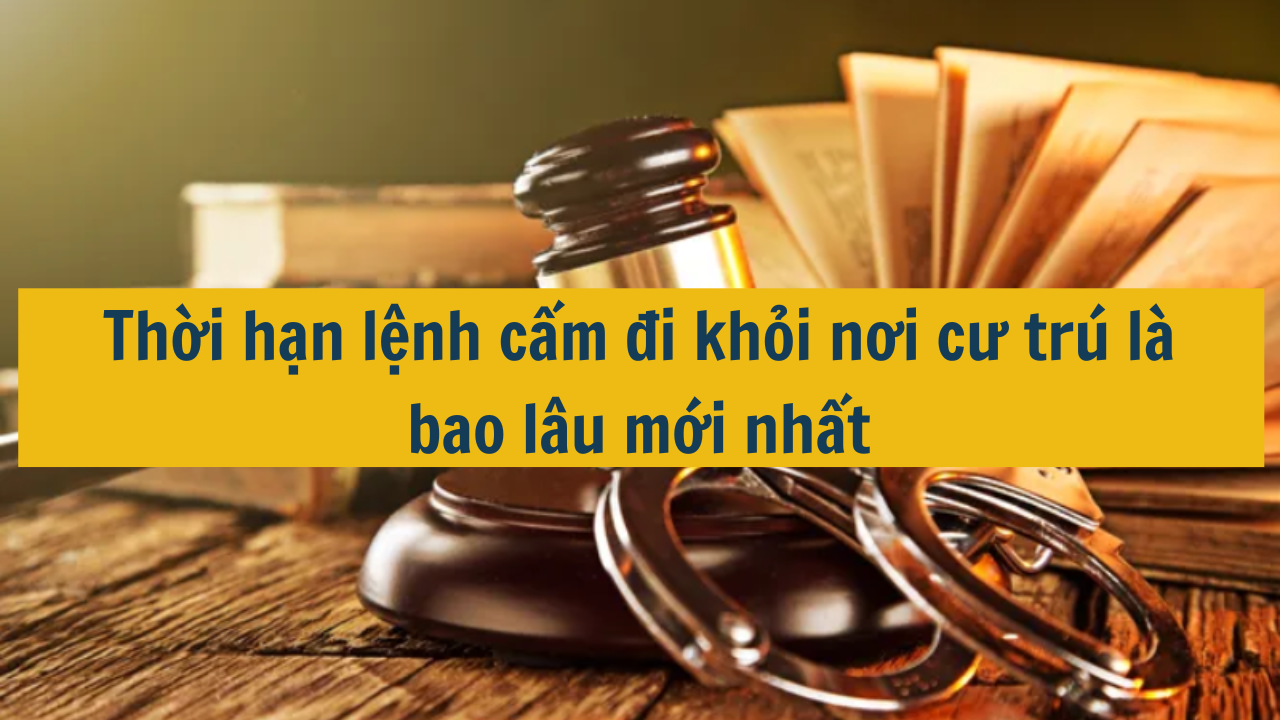
Thời hạn lệnh cấm đi khỏi nơi cư trú là bao lâu mới nhất năm 2025?
Người bị cấm đi khỏi nơi cư trú theo quy định của Bộ luật tố tụng hình sự 2015 sẽ bị hạn chế một số quyền, tuy nhiên vẫn có quy định về thời hạn của lệnh cấm đi khỏi nơi cư trú. Sau đây là bài viết về thời hạn lệnh cấm đi khỏi nơi cư trú là bao lâu mới nhất năm 2025 và các vấn đề liên quan. 21/01/2025Mẫu lệnh cấm đi khỏi nơi cư trú của Tòa án mới nhất năm 2025
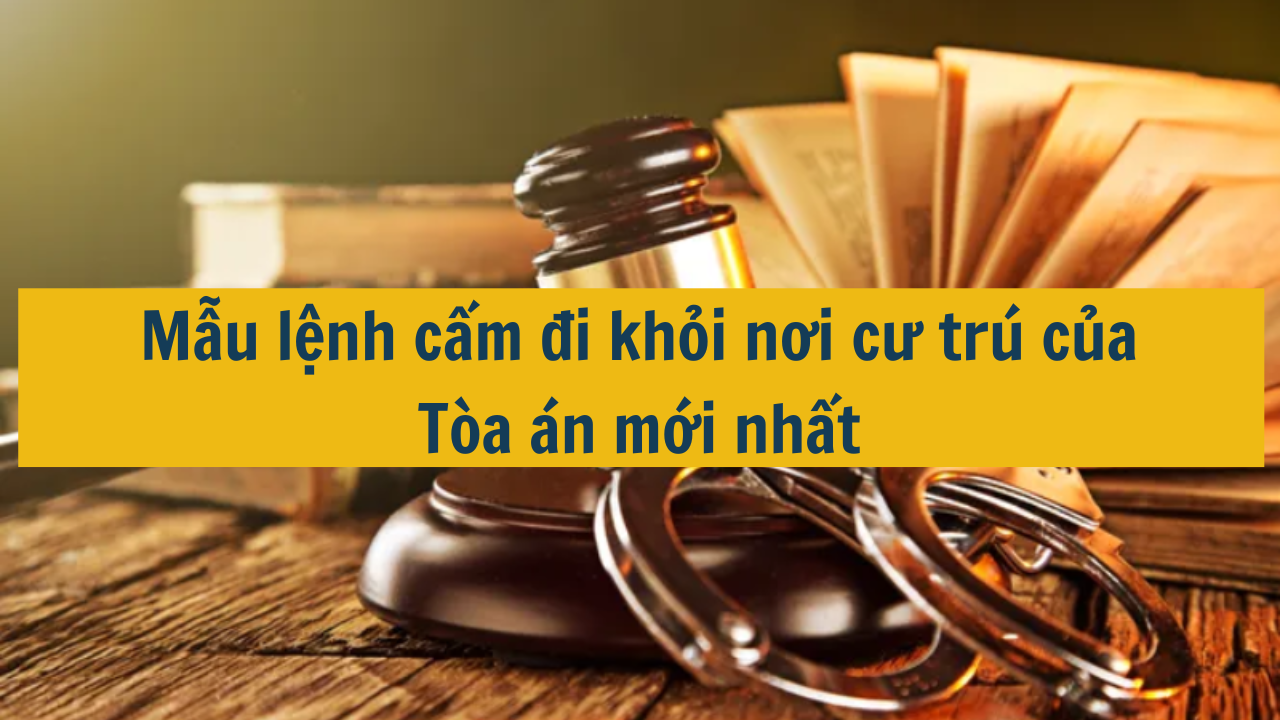
Mẫu lệnh cấm đi khỏi nơi cư trú của Tòa án mới nhất năm 2025
Người bị cấm đi khỏi nơi cư trú theo quy định của Bộ luật tố tụng hình sự 2015 sẽ bị hạn chế một số quyền. Sau đây là mẫu lệnh cấm đi khỏi nơi cư trú của Tòa án mới nhất 2025 và một số vấn đề liên quan. 21/01/2025Thế nào là cấm đi khỏi nơi cư trú? Ai có thẩm quyền ra lệnh cấm đi khỏi nơi cư trú mới nhất 2025?
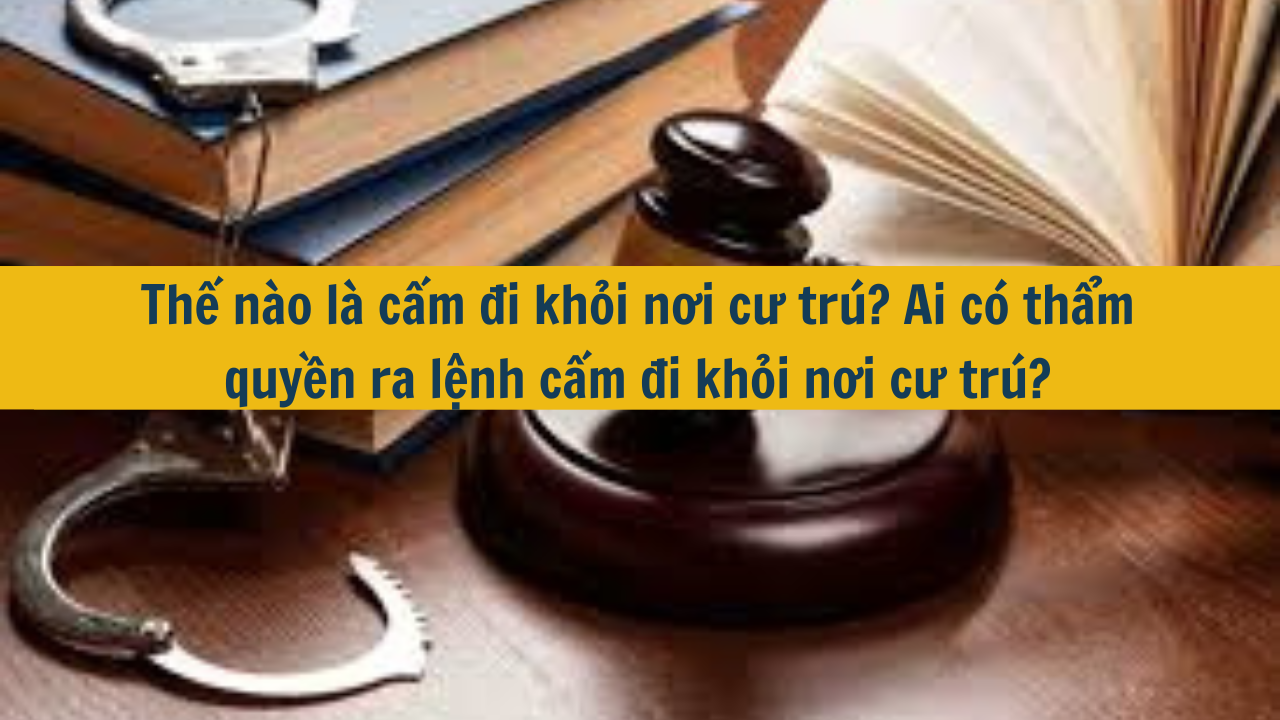
Thế nào là cấm đi khỏi nơi cư trú? Ai có thẩm quyền ra lệnh cấm đi khỏi nơi cư trú mới nhất 2025?
Cấm đi khỏi nơi cư trú, tạm giữ, tạm giam,.là những biện pháp ngăn chặn được quy đinh trong Bộ luật tố tụng hình sự 2015 với mục đích để kìm hãm sự phát triển của hành vi phạm tội. Vậy thế nào là cấm đi khỏi nơi cư trú? Ai có thẩm quyền ra lệnh cấm đi khỏi nơi cư trú ? Bài viết sau sẽ làm rõ những vấn đề này. 21/01/2025Đang bị cấm đi khỏi nơi cư trú có được đưa người thân đi cấp cứu ở xa năm 2025?
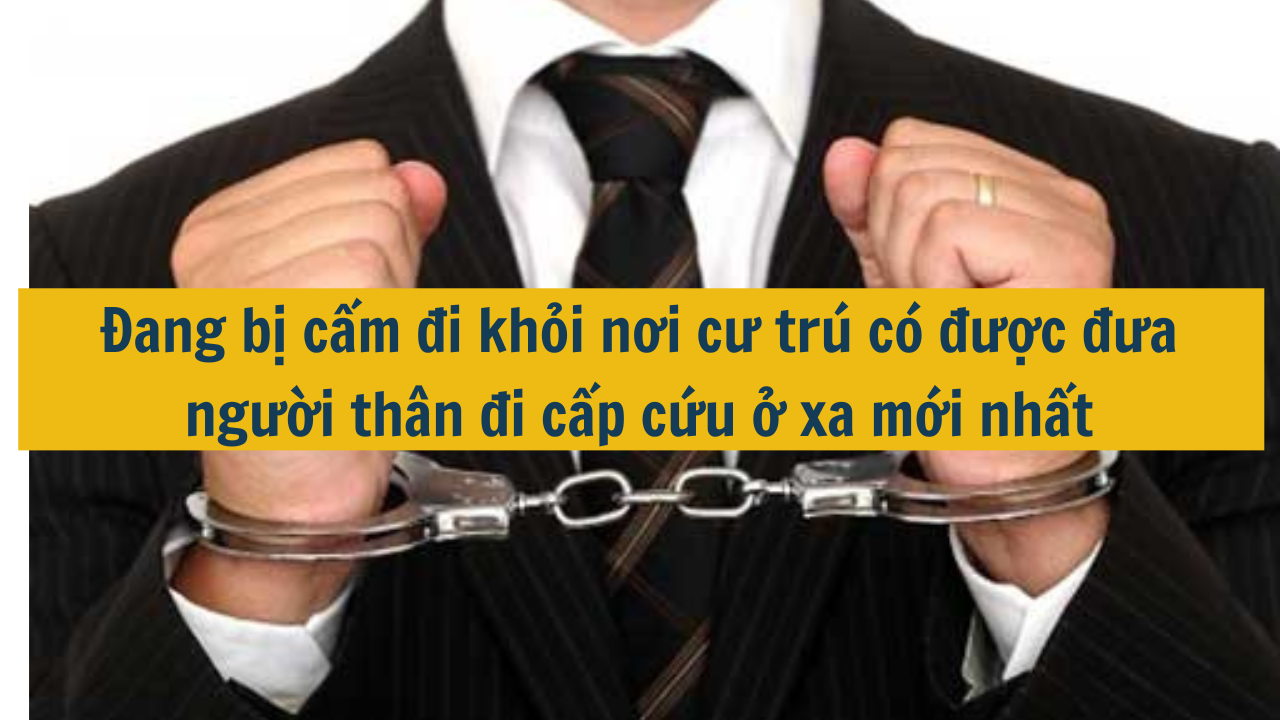
Đang bị cấm đi khỏi nơi cư trú có được đưa người thân đi cấp cứu ở xa năm 2025?
Người đang bị cấm đi khỏi nơi cư trú sẽ bị hạn chế một số quyền cơ bản của công dân. Tuy nhiên, trong những trường hợp đặc biệt, bất khả kháng người cấm đi khỏi nơi cư trú vẫn có thể thực hiện được quyền đi lại của mình. Bài viết sau đây sẽ làm rõ vấn đề đang bị cấm đi khỏi nơi cư trú có được đưa người thân đi cấp cứu ở xa năm 2025 không? 21/01/2025Cấm đi khỏi nơi cư trú có được đi làm không 2025?
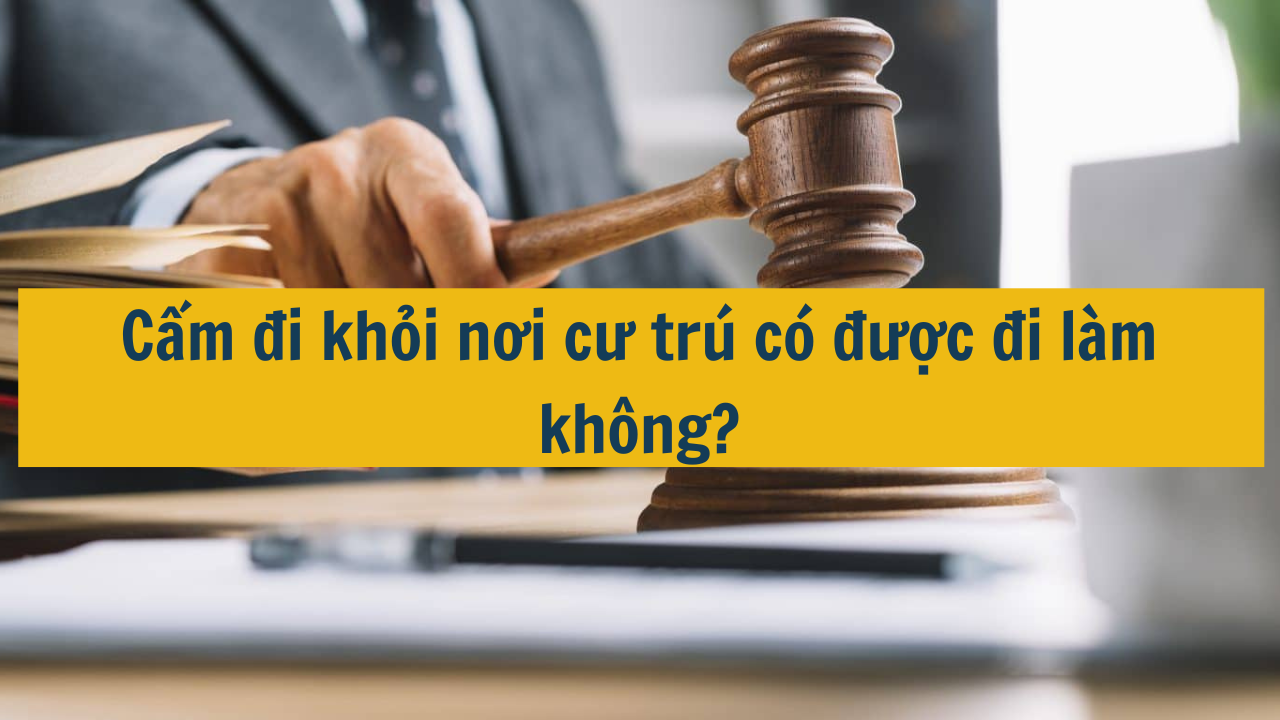
Cấm đi khỏi nơi cư trú có được đi làm không 2025?
Cấm đi khỏi nơi cứ trú là một trong những biện pháp ngăn chặn được quy định trong Bộ luật tố tụng hình sự. Vậy người bị cấm đi khỏi nơi cư trú bị hạn chế những quyền gì? Bài viết sau đây sẽ làm rõ vấn đề này. 21/01/2025Các trường hợp cấm đi khỏi nơi cư trú 2025?

Các trường hợp cấm đi khỏi nơi cư trú 2025?
Cấm đi khỏi nơi cư trú là một trong những biện pháp ngăn chặn đã được quy định trong Bộ luật Tố tụng Hình sự. Theo đó, quy định tại Điều 123 của Bộ luật Tố tụng hình sự năm 2015 đã quy định cụ thể nghĩa vụ của bị can, bị cáo được áp dụng biện pháp cấm đi khỏi nơi cư trú phải cam đoan; bổ sung thời hạn áp dụng đối với biện pháp cấm đi khỏi nơi cư trú. Bài viết sau đây sẽ làm rõ về biện pháp cấm đi khỏi nơi cư trú và các bài viết liên quan. 21/01/2025Cấm đi khỏi nơi cư trú là gì? 06 điều cần biết về cấm đi khỏi nơi cư trú mới nhất năm 2025?

Cấm đi khỏi nơi cư trú là gì? 06 điều cần biết về cấm đi khỏi nơi cư trú mới nhất năm 2025?
Luật Cư trú năm 2020 cơ bản kế thừa quy định của Luật hiện hành, đồng thời sửa đổi, bãi bỏ và làm rõ hơn các quy định trước đây nhằm bảo đảm tốt hơn nữa quyền tự do cư trú của công dân; góp phần nâng cao hơn nữa hiệu quả công tác quản lý nhà nước về an ninh, trật tự trong tình hình mới; thực hiện việc đơn giản hóa thủ tục hành chính, giấy tờ công dân liên quan đến công tác đăng ký, quản lý cư trú; đáp ứng yêu cầu ứng dụng khoa học, công nghệ tiên tiến trong công tác quản lý cư trú mà trọng tâm là xây dựng, quản lý cư trú qua Cơ sở dữ liệu quốc gia về dân cư. Bài viết sau đây sẽ làm rõ về chủ đề cấm đi khỏi nơi cư trú và các vấn đề xung quanh nó. 03/01/2025Phân biệt cách tính trợ cấp thôi việc và trợ cấp mất việc làm

Phân biệt cách tính trợ cấp thôi việc và trợ cấp mất việc làm
Trợ cấp thôi việc và trợ cấp mất việc làm là hai hình thức hỗ trợ tài chính khác nhau dành cho người lao động khi chấm dứt hợp đồng lao động. Mặc dù đều liên quan đến việc kết thúc công việc, nhưng cách tính và điều kiện hưởng của hai loại trợ cấp này có những điểm khác biệt rõ rệt. Cùng xem bài viết Phân biệt cách tính trợ cấp thôi việc và trợ cấp mất việc làm dưới đây để hiểu rõ hơn về 02 loại trợ cấp này. 18/11/2024Quy định về giữ người trong trường hợp khẩn cấp theo Bộ luật Tố tụng hình sự 2015
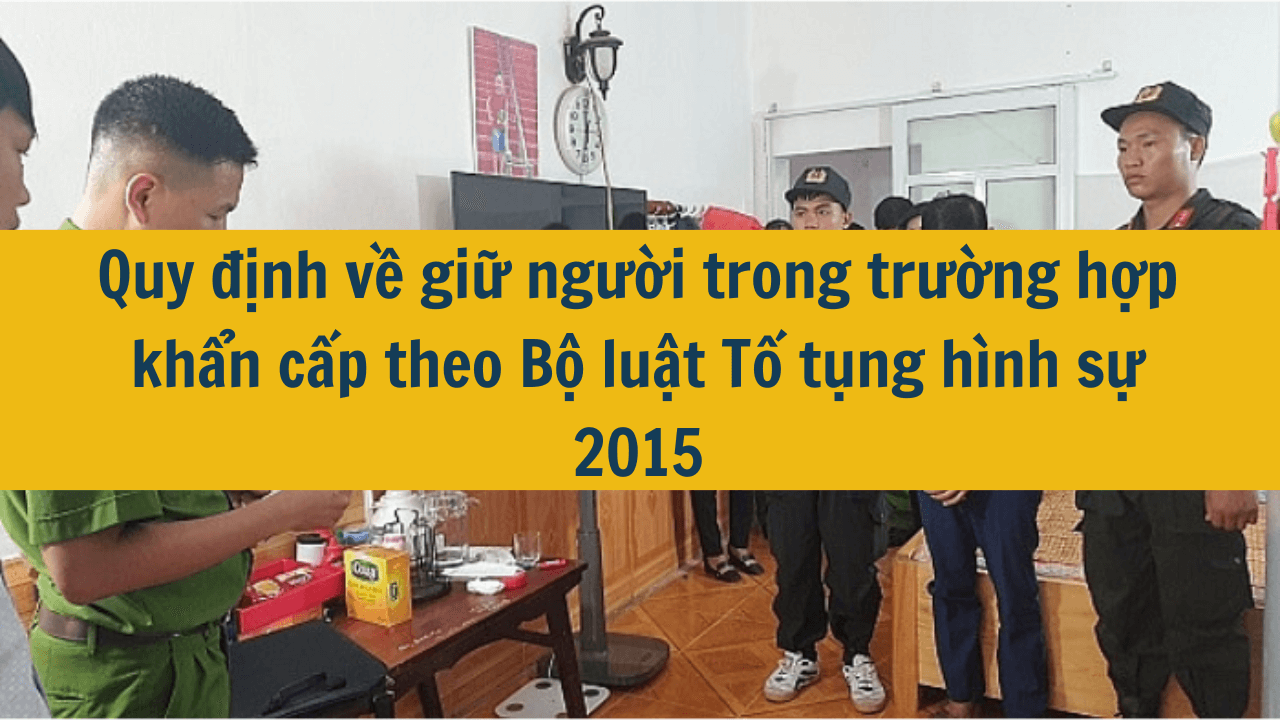

 Bộ luật Tố tụng hình sự 2015 (Bản Pdf)
Bộ luật Tố tụng hình sự 2015 (Bản Pdf)
 Bộ luật Tố tụng hình sự 2015 (Bản Word)
Bộ luật Tố tụng hình sự 2015 (Bản Word)